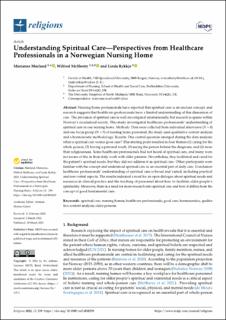| dc.contributor.author | Morland, Marianne | |
| dc.contributor.author | McSherry, Wilfred | |
| dc.contributor.author | Rykkje, Linda Lee Risnes | |
| dc.date.accessioned | 2023-02-15T08:28:19Z | |
| dc.date.available | 2023-02-15T08:28:19Z | |
| dc.date.created | 2022-03-15T10:08:10Z | |
| dc.date.issued | 2022 | |
| dc.identifier.citation | Religions. 2022, 13 (3), | en_US |
| dc.identifier.issn | 2077-1444 | |
| dc.identifier.uri | https://hdl.handle.net/11250/3050915 | |
| dc.description | This article is an open access article distributed under the terms and conditions of the Creative Commons Attribution (CC BY) license (https:// creativecommons.org/licenses/by/ 4.0/) | en_US |
| dc.description.abstract | Nursing home professionals have reported that spiritual care is an unclear concept, and research suggests that healthcare professionals have a limited understanding of this dimension of care. The provision of spiritual care is well-investigated internationally, but research is sparse within Norway’s secularized society. This study investigated healthcare professionals’ understanding of spiritual care in one nursing home. Methods: Data were collected from individual interviews (N = 8) and one focus group (N = 5) of nursing home personnel; the study used qualitative content analysis and a hermeneutic methodology. Results: One central question emerged during the data analysis: what is spiritual care versus good care? This starting point resulted in four themes (1) caring for the whole person, (2) having a personal touch, (3) seeing the person behind the diagnosis, and (4) more than religiousness. Some healthcare professionals had not heard of spiritual care, and many were not aware of this in their daily work with older patients. Nevertheless, they facilitated and cared for the patient’s spiritual needs, but they did not address it as spiritual care. Other participants were familiar with the concept and understood spiritual care as an essential part of daily care. Conclusion: healthcare professionals’ understanding of spiritual care is broad and varied, including practical and non-verbal aspects. The results indicated a need for an open dialogue about spiritual needs and resources in clinical practice and the teaching of personnel about how to facilitate older people’s spirituality. Moreover, there is a need for more research into spiritual care and how it differs from the concept of good fundamental care. | en_US |
| dc.language.iso | eng | en_US |
| dc.publisher | Utgiver MDPI | en_US |
| dc.rights | Navngivelse 4.0 Internasjonal | * |
| dc.rights.uri | http://creativecommons.org/licenses/by/4.0/deed.no | * |
| dc.subject | older persons | en_US |
| dc.subject | qualitative content analysis | en_US |
| dc.subject | hermeneutics | en_US |
| dc.subject | good care | en_US |
| dc.subject | healthcare professionals | en_US |
| dc.subject | nursing homes | en_US |
| dc.subject | spiritual care | en_US |
| dc.title | Understanding spiritual care-perspectives from healthcare professionals in a norwegian nursing home | en_US |
| dc.type | Peer reviewed | en_US |
| dc.type | Journal article | en_US |
| dc.description.version | publishedVersion | en_US |
| dc.rights.holder | © 2022 by the authors. Licensee MDPI, Basel, Switzerland. | en_US |
| dc.source.pagenumber | 1-15 | en_US |
| dc.source.volume | 13 | en_US |
| dc.source.journal | Religions | en_US |
| dc.source.issue | 3 | en_US |
| dc.identifier.doi | 10.3390/rel13030239 | |
| dc.identifier.cristin | 2009870 | |
| dc.source.articlenumber | 239 | en_US |
| cristin.ispublished | true | |
| cristin.fulltext | original | |
| cristin.qualitycode | 1 | |

